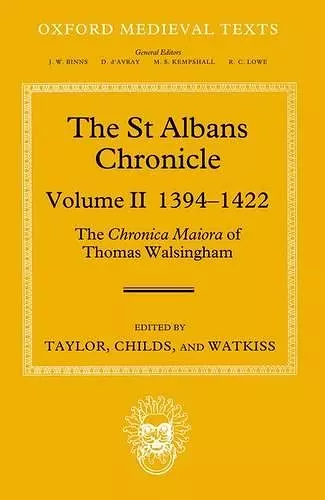The St Albans Chronicle
The Chronica maiora of Thomas Walsingham: Volume II 1394-1422
John Taylor editor Wendy R Childs editor Leslie Watkiss editor
Format:Hardback
Publisher:Oxford University Press
Published:23rd Jun '11
Currently unavailable, and unfortunately no date known when it will be back

Winner of the American Historical Association's 2013 J. Franklin Jameson Prize
Thomas Walsingham has been described as the last of the great medieval chroniclers, and his St Albans Chronicle is arguably the most important account of English history to be written at this time. This is the first modern edition, and it provides a facing-page English translation, substantial historical commentary, and textual notes.Thomas Walsingham, a monk of St Albans, has been described as the last of the great medieval chroniclers. His major work, the Chronica maiora, covers the years 1376-1422, and is arguably the most important account of English history to be written in England at this time. Walsingham's text has never been published as a continuous whole. It is found in no fewer than three separate publications in the Rolls Series, and was printed from manuscripts whose exact identity was not then clearly understood. The nature of the Rolls Series publications, and the different versions of the chronicle have raised questions concerning the relationship of the various manuscripts of the Chronica maiora, and also of Walsingham's own involvement with the text. In this new edition these problems are considered and the Chronica maiora is shown to be predominantly the work of one man, Thomas Walsingham. Volume II of the St Albans Chronicle (1394-1422) now completes the edition. Drawing on the text in Bodley 462 and confirming the work of V. H. Galbraith, the editors make clear that the Annales Ricardi Secundi et Henrici Quarti (regarded in the Rolls Series as a separate chronicle) were an integral part of the Chronica maiora. They also argue that, while Walsingham's contribution as author in the later years was much smaller than in the years to 1393 (when he was without doubt the sole author), it is most likely that he supervised the whole work; and at times, as in the vivid and dramatic descriptions of the battles of Shrewsbury and of Agincourt, his own style is again apparent. The chronicle is of the greatest historical value for Richard II's last years and for his deposition and the accession of Henry IV. It is wholly in favour of the Lancastrian revolution of 1399 and remains 'Lancastrian' in tone to its end. It illustrates (with sympathy) Henry's difficulties in establishing the dynasty and includes unique material on his relations with...
Decades of learning have gone into the production of this edition of Walsingham's chronicle ... [Leslie] has produced a very readable and accurate translation of what is occasionally a difficult text. Indeed, it is hard to fault this edition: the introduction is clear and detailed, the footnotes are extensively researched and always helpful, and the production of the volume matches the high standards to be expected from Oxford Medieval Texts. This combined expertise has produced what will surely become the standard edition of this marvellous chronicle. * Chris Given-Wilson, English Historical Review *
In its distinguished, senior coadjutor, John Taylor, this edition can claim a direct link with a pivotal moment early in modern scholarship on the St Albans tradition: the post-Rolls revisionism of V. H. Galbraith. ... this second volume completes a project which has offered a sincere coda to a formative phase in modern criticism but it fails to adumbrate a new course through this rich and complex tradition. * James G. Clark, Journal of Ecclesiastical History *
ISBN: 9780199253463
Dimensions: 217mm x 139mm x 58mm
Weight: 1336g
992 pages